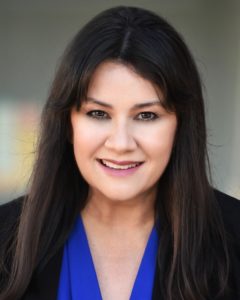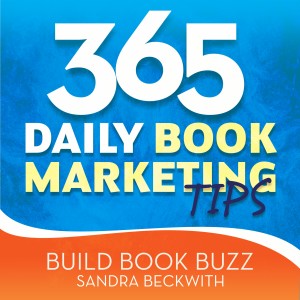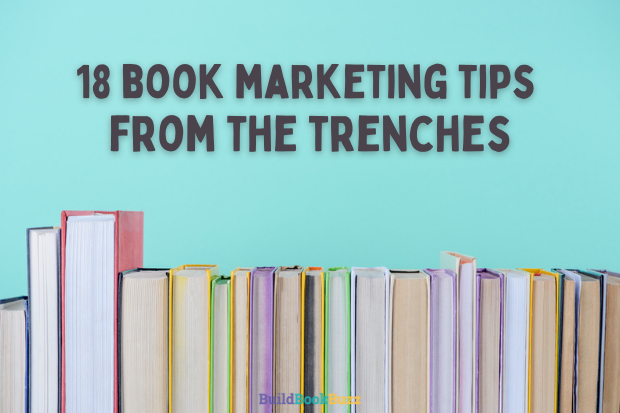18 book marketing tips from the trenches
18 authors and marketing pros offer their best book marketing tips. Which of these will you add to your book marketing plan?
I love hearing from authors about what they’re doing to promote their books that’s actually working for them.
With that in mind, I used my book marketing Facebook group and “Help a Reporter Out” – HARO – to ask authors, book marketers, book publicists, and publishers for their best book marketing tips.
They did not disappoint. There’s a lot of wisdom in their responses, whether their advice is to zero in on a narrow target audience or to use email marketing.
Book marketing tips
Here’s what they had to say, in no special order. Big thanks to all of them for sharing their experiences with us.
Fauzia Burke, book publicist and author, Online Marketing for Busy Authors
A regularly updated author website is essential.
Too many authors don’t have a website or it is one that has not been updated in months or even years. Your author website should be a workhorse and not a show pony. If there isn’t valuable content, it won’t matter if it looks good. People won’t have a reason to stay, much less revisit it.
Make sure your website is easy to navigate, and is useful to your audience. Without new content, there is no reason to come to your website. Keeping your audience engaged with new content is key to audience retention. If the only content on your website is what people can find on Amazon, what’s the reason to come to your website? Make sure that your content is unique and valuable to your readers. Once you have a website with fresh and unique content, you’ll be able to direct people from social media to visit your site and learn about your books.
 Tiffany Obeng, author, Scout’s Honor: A Kid’s Book about Lying and Telling the Truth
Tiffany Obeng, author, Scout’s Honor: A Kid’s Book about Lying and Telling the Truth
Write and publish a book that people actually want.
This tip made marketing 100% easier for me. By publishing something people were searching for, my job was nearly done. I then just needed to create and deliver a quality product that met the customers’ needs. I did this by conducting market research. I searched the topic on Google to determine if the topic was relevant and I researched potential competitor books.
For example, last September, I noticed there was an active customer base for children’s books about honesty. I then researched other children’s books about that topic to see what they provided and what they were missing. Next, I carefully created a book about honesty that kept the things people loved about other books on that subject, and added the things people wanted but didn’t find.
My book was an Amazon Hot Release for weeks, is still purchased daily, and has been featured as a recommended book in magazines. All of this happened without paid promotion on my end. The book marketed itself.
 Anita Petty, author, Money Switch: Flip Yourself Onto Happiness, Health & Wealth
Anita Petty, author, Money Switch: Flip Yourself Onto Happiness, Health & Wealth
Throw a book launch party.
A book launch party can do many things for a new book:
- Boost sales
- Increase social media presence
- Opportunity to promote other products or services
- Great forum for others to talk about your book and share reviews
- Media opportunity: Invite the local press.
- Create videos of event and interviews to share on social media.
The best part of all: A launch party is a great way to invite sponsors to contribute and help pay for the event. Swag bag giveaways can help defray the event costs while enabling your sponsors to market to your audience.
 Ross Kernez, author, The Digital Marketing Bullet Train: Get Onboard or Get Left Behind
Ross Kernez, author, The Digital Marketing Bullet Train: Get Onboard or Get Left Behind
Understand exactly who your book is for and speak to them in your messaging.
Every product will appeal to multiple types of people (personalities). Your job is to identify the most profitable personality or the one you believe will benefit most from your book, and speak to that person and only that person. Now you might be thinking you will alienate other potential audiences. True, you will. But you will potentially alienate everyone by speaking to no one specific. Your words will resonate and strike a chord when you focus on the right personality. Spend time researching your ideal audience and create a value proposition that will leave them curious and intrigued by your book.
Your job is to identify the most profitable personality or the one you believe will benefit most from your book, and speak to that person and only that person.Click to tweet Kim Stewart, podcast publicist and host, Book Marketing Mania podcast
Kim Stewart, podcast publicist and host, Book Marketing Mania podcast
Be a guest on podcasts to market your book to new readers.
By guesting on podcasts, you can share your book’s message of organically with new readers by serving on other people’s platforms. Podcasts hosts work very hard to grow an engaged audience that trusts them to bring value to their busy lives. Being an invited guest on a podcast is such an honor, and when the listeners trust their host, they will trust you as a guest. Podcast interviews usually last 30 to 40 minutes and as listeners hear your authentic voice engaging with the host, encouraging listeners, solving problems they have, there will be an instant connection to you as an author, especially if they’ve never heard of you before.
If you show up to serve well by bringing lots of value to your conversation, you can naturally lead listeners to your book, or to your email list, where they’ll discover additional content to help them take action on what you shared in your interview, including buying your book.

Scott Graham, author, 15 books
Pay attention to your search engine results page.
The most important factor is your author brand SERP. SERP stands for search engine results page. It takes work but you can significantly impact what shows up when someone Googles your name. This includes the Google Knowledge Panel, the box that contains information Google itself thinks is important to your search result. This is not to be confused with a Google Business Listing/Panel. Google creates this panel itself and you can only influence the information that appears in it. I’ve connected the Google search engine to my photo, author website, and social profiles. The panel also includes my birthdate and a description of me. Here’s my brand SERP.
 Jeremy Morang, author, The Surrender Game: The Guardian War Chronicles Vol 1
Jeremy Morang, author, The Surrender Game: The Guardian War Chronicles Vol 1
Create an effective email marketing campaign.
My best marketing tip for authors is to create an effective email marketing campaign that engages your readers with high quality content, teasers and promotions to highlight new and re-releases. If you are an aspiring author and you don’t already have an email list your audience can subscribe to, this needs to be your next big to-do. Email lists are nothing new in the world of book marketing, yet there are still so many authors who haven’t tapped into this resource yet, and it’s pure gold.
When someone subscribes to an email list, they are signaling that they are already sold. They came to your site, sampled your content, and they’ve made a decision to “consume” more of you. Now, it’s your job as the author to follow through and deliver the quality content your reader signed up for when they subscribed. Understanding the latter is where the challenge lies for many authors.
 Maria McDowell, author, Processing A Heartbreak and Moving On
Maria McDowell, author, Processing A Heartbreak and Moving On
Use email marketing.
Email marketing remains my first book promotion and marketing strategy. When I published my first book, which was nonfiction self-help, I gave away the e-book version free in exchange for the reader’s email address. I distributed about 10,000 e-books, and got as many email addresses as a result. When I published a follow-up to that book, I sent an e-mail to everyone on my list to notify them that I had just launched the second version of the first book. This strategy helped me sell more than 4,000 copies in the first week of its launch. Email marketing should be the best tool for authors to market their books.
 Kris Bordessa, author, Attainable Sustainable: The Lost Art of Self-Reliant Living
Kris Bordessa, author, Attainable Sustainable: The Lost Art of Self-Reliant Living
Create a network of people in your niche to help spread the word when the book launches.
My book dropped at about the same time as the pandemic arrived in full force, so in-person events were non-existent. Thankfully, I had assembled a big list of bloggers, podcasters, and other authors who were interested in my topic and able to talk about the book on their channels, either as a review or excerpt on their own blog, or on social media. This also allowed me to share more on my channels; instead of me talking about my book (which everyone gets tired of!), it was great to be able to share what other people were saying.
 K.M. del Mara, author, Twist a Rope of Sand
K.M. del Mara, author, Twist a Rope of Sand
Focus, focus, focus.
Three words helped me with my latest book: focus, focus, and focus. I followed a new plan, which was to get all my ducks in order – every last beak and feather, it seemed – before starting to write (per the book The Anatomy of Story, by John Truby). It was having a clear idea of what I wanted to say, what difficulties I anticipated in trying to say it, what concepts I would try to put forth, and so much more, that gave the whole project focus, not only with writing but with marketing, too. It helped me decide keywords, form a clearer description than I usually manage, create Facebook posts, etc., and I’ll continue to go back to the outline as I go forward.
 Linda Hansen, author, Otto the Otter, A Big Surprise
Linda Hansen, author, Otto the Otter, A Big Surprise
You must knock on a lot of doors to get one or more to open.
Marketing a book takes a lot of time, effort, and the willingness to ask a lot of people if they will sell your book in their store, allow you to have a meet the author and book signing event, visit a school, sell at a market, and the many other opportunities that are possible. Marketing is not only about selling your book, but it is also about doing publicity. This means reaching out to radio and TV stations for interviews, getting on podcasts, and getting magazine and newspaper articles and reviews. In the end, if you don’t make the effort to knock on doors, you can’t be told “yes” or “no.” And, “no” doesn’t mean they don’t like you; it just means not now.
 Laura Akers, author, the Davia Glenn series
Laura Akers, author, the Davia Glenn series
Learn from experts.
The success of your book is dependent on reaching your target audience. I studied and applied tips from Sandra Beckwith’s Build Book Buzz website, read David Gaughran’s books on building an author platform and using Amazon Ads, and learned about keywords and marketing via Kindleprenuer’s articles. Other useful resources are classes on Udemy, marketing experts on Fiverr, blogs, and podcasts to help you find what’s suitable for you and your budget.
 Tylar Paige, author, F*ck You, Watch This: Tired of choosing the wrong men, she finally chose herself
Tylar Paige, author, F*ck You, Watch This: Tired of choosing the wrong men, she finally chose herself
Post unique and creative content on social media every single day.
Facebook groups are essential for book marketing. I have sold hundreds of copies of my book in a single day just by sharing my book (along with a creative story) to groups. I also make sure to engage with my readers and any comments that are relevant. TikTok videos are also helpful, when you can jump on a trend and add context in the form of “the story” of your book. This is the best way to intrigue and entice your potential readers. Be consistent with your hashtag across all social media. Be a podcast guest, then share your show links on social media, as well.
 Kelly Van Zandt, author, Powerful Postpartum
Kelly Van Zandt, author, Powerful Postpartum
Sell your book by building a community on Instagram.
My book, Powerful Postpartum, discusses early motherhood, and I make an effort to establish meaningful connections not only with mothers, but also with like-minded individuals and industry professionals such as doulas, midwives, and therapists. If I wholeheartedly support their ideas, I share their posts with credit, comment, or write a personal note to connect.
These connections have turned into both book sales and a beautiful community. This Instagram community has become an added network of referrals, for which I am eternally grateful. Oftentimes, readers even are compelled to share quotes and images from the book on their own account pages, which is great because we all know the power of personal reviews and recommendations.
Most often, Instagram users will include hashtags to increase their own post engagement, but you can also take some time to search and follow your industry hashtags to discover new connections. Following hashtags is a great way to become exposed to new accounts that may connect with your message.
 Sophia Demas, author, The Divine Language of Coincidence: How Miracles Transformed My Life After I Began Paying Attention
Sophia Demas, author, The Divine Language of Coincidence: How Miracles Transformed My Life After I Began Paying Attention
Go old school.
My husband made fliers with tear-off strips printed with my book title and website URL; I put them up on kiosks on UPenn’s campus. People are actually tearing off the tabs. He also created a t-shirt imprinted with my book cover that turns him into a human billboard.
 H.R. Bellicosa, author, The Punishings
H.R. Bellicosa, author, The Punishings
Link your book to relevant events and groups.
Each book, fiction or nonfiction, falls into a particular niche, and you need to target that same niche when marketing your book. If you are marketing a novel about refugees during World War II, you must target historical societies and refugee charity organizations. People in those groups will be most interested in your work. Offer to speak at local historical society meetings, ask your local museum if they’ll sell your book, and give a talk at your local library. Link the book to events such as World Refugee Day on your social media channels, and post news articles about the subject with a link to your book.
Each book, fiction or nonfiction, falls into a particular niche, and you need to target that same niche when marketing your bookClick to tweetMy book is a novel about reproductive rights, so I market it to feminist activists and organized groups that are fighting for reproductive justice since they are the demographic mos tinterested in that topic. You can also choose to donate a portion of proceeds to a charity that is linked to your book’s niche. I’ve chosen to donate to the ACLU, a group committed to suing states that enact restrictive reproductive laws. Once you find your target niche, you’ll be happily surprised at how eager people are to read and support your work. That’s why you always want to have business cards and bookmarks with your book’s title, cover, and website ready to hand out.
 Amy Lyle, author, The Book of Failures
Amy Lyle, author, The Book of Failures
Professional photography can land you free press.
When launching The Book of Failures, I was my own PR person. I hired a photographer friend to capture something for the book covers. Not only did we get the perfect covers, but we were also able to get about a dozen really funny shots that led to multiple features in publications. Local and even larger publications may be more compelled to run your story if you have quality photography, as it makes the story more interesting and it saves them time and money.
My book’s publicity generated paid (and unpaid) speaking engagements, including a Boston TEDx, television appearances, and invitations to more than 30 podcasts. The free publicity helped drive my books to #1 bestsellers in the very competitive humor and entertainment niche and land on Goodreads’ Top 10 Best Humor list.

Kami Hoss, author, If Your Mouth Could Talk
Invest in digital marketing.
We invested heavily in Facebook and social media advertisements to promote my book and saw great success with these ads. Be sure that your ads stand out and provide a shocking statistic or information that entices them to click on the advertisement and purchase your book. Partnering with a digital marketing agency is a great way to ensure that your goals are accomplished and you convert as many customers as possible.
Get a book marketing tip in your inbox every day

Need more book marketing tips and advice?
Get a pithy book marketing tip in your inbox every day for an entire year for just $1 with the Build Book Buzz “365 Daily Book Marketing Tips” email series.
Each day, you’ll receive a short and to-the-point tip from one of many book marketing categories ranging from selling on Amazon to getting reviews to using Goodreads and pitching podcasts, among many, many more.
Always actionable, each pithy tip will give you something specific you can do every day to support your book — and for just $1 for a total of 365 tips.
Start receiving — and using — your 365 Daily Book Marketing Tips now here.
What’s your best book marketing tip? Please tell us in a comment!
Like what you’re reading? Get it delivered to your inbox every week by subscribing to the free Build Book Buzz newsletter. You’ll also get my free “Top 5 Free Book Promotion Resources” cheat sheet immediately!



Thanks to you, Sandy and all the authors for sharing your tips. I am excited to find authors in my genre. I will be trying many of these strategies.
Sonia, I’m so happy that so many were willing to share their wisdom with us!
Sandy
This list had some ideas new to me, so thanks especially to Tiffany Obeng, Scott Graham, and H. R. Bellicosa!
Tiffany Obeng, HOW did you notice there was an active customer base for children’s books about honesty?? Where did you go to discover this?
I often think I’m good at research for book marketing, but this has left me flummoxed!
Kay, One way is through Google research. For example, I typed in children’s books about lying and saw if Google had search suggestions. Search suggestions signify that people are searching this topic. I also use Google trends and search the topic there to see when and where the topic is popular. These are a couple of free tools I use. For Amazon specifically, I use a paid program called Publisher Rocket.
I hope this helps!
Tiffany–yes, I use Publisher Rocket; but had not realized Google Search Suggestions = people are looking for it! And I must go find out about Google Trends–thanks and am curious about the free tools–have not seen these talked about anywhere. What helpful tactics you have shared with us–thank you.
Thank you for your time and sharing the authors perspectives. Absolutely, writing is a great pleasure to put on black and white what is buried in mind. One can express based on experience and observation. As life is a journey countless encountering would happen and to share that with world community is a delight.
With appreciation and regards,
Yeshi Gemaneh
I hope their experiences help you, Yeshi.
Sandy
Tiffany–yes, I use Publisher Rocket; but had not realized Google Search Suggestions = people are looking for it! And I must go find out about Google Trends–thanks and am curious about the free tools–have not seen these talked about anywhere. What helpful tactics you have shared with us–thank you.
GREAT tips—I’ve read and printed this up, and it’s motivated me to get on task with marketing! Thanks, Sandra and all the authors who offered suggestions.
I’m so glad their advice is helpful, Ann Marie! Thanks for the feedback!
Sandy
Terrific guidance here. Thank you.
You’re welcome, J.C.!
Sandy
Since I’m the director of a children’s book non-profit and an author, I have to get tips on the fly. Much thanks for the concise and timely information that brings value to my efforts.
Vic
I’m so glad they’re helpful, Vic. Thanks for the feedback! (And BTW, a dear friend of mine who shares your name died several years ago, so I might have stopped breathing for a few minutes when I saw this!)
Sandy